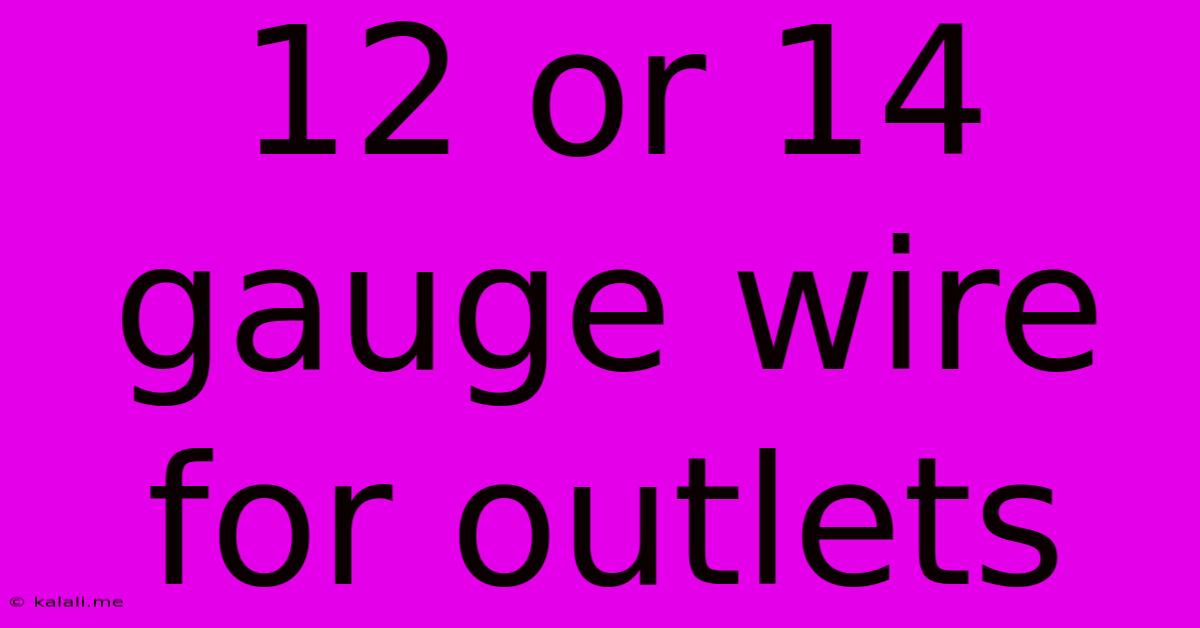12 Or 14 Gauge Wire For Outlets
Kalali
Jun 05, 2025 · 3 min read

Table of Contents
12 Gauge vs. 14 Gauge Wire for Outlets: Choosing the Right Gauge
Choosing the right gauge of wire for your electrical outlets is crucial for safety and performance. This article will help you understand the differences between 12-gauge and 14-gauge wire, and determine which is the best choice for your home wiring projects. Understanding wire gauge and its implications for your electrical system is essential for preventing electrical hazards and ensuring efficient power delivery.
What does wire gauge mean? Wire gauge refers to the diameter of the wire. A lower gauge number indicates a thicker wire, which can carry more current. Thicker wires are less prone to overheating, a significant safety concern.
14 Gauge Wire: The Basics
14-gauge wire is commonly used for lighting circuits and outlets with lower power demands. It's thinner and less expensive than 12-gauge wire, making it a seemingly attractive option. However, its lower current-carrying capacity limits its applications. Overloading a 14-gauge circuit can lead to overheating and potentially dangerous situations.
Key Considerations for 14 Gauge Wire:
- Amperage Limit: 14-gauge wire is typically rated for a maximum of 15 amps.
- Applications: Suitable for circuits with low amperage demands, like lighting circuits and some low-power outlets.
- Cost: Generally less expensive than 12-gauge wire.
- Safety: While suitable for appropriate applications, exceeding its amperage limit can create fire hazards.
12 Gauge Wire: The Safer Choice for Most Outlets
12-gauge wire is thicker and capable of carrying more current than 14-gauge wire. This makes it the preferred choice for most outlets, especially those likely to power high-drain appliances. Its increased capacity reduces the risk of overheating and ensures efficient power delivery. Using 12-gauge wire often prevents future circuit upgrades and potential safety issues.
Key Considerations for 12 Gauge Wire:
- Amperage Limit: 12-gauge wire is typically rated for a maximum of 20 amps.
- Applications: Ideal for circuits powering higher-demand appliances and outlets in kitchens, bathrooms, and other areas with multiple outlets.
- Cost: More expensive than 14-gauge wire.
- Safety: Offers greater safety margin and reduces the risk of overheating and fire hazards.
Choosing Between 12 Gauge and 14 Gauge Wire: A Practical Guide
The decision between 12-gauge and 14-gauge wire depends heavily on the anticipated load of the circuit. Always consult your local electrical codes and regulations before beginning any electrical work. Here's a simple guideline:
- High-power Appliances: If the circuit will power appliances like microwaves, ovens, dryers, or space heaters, 12-gauge wire is strongly recommended. These appliances draw significant current and could overload a 14-gauge circuit.
- Standard Outlets: For standard outlets in rooms with moderate appliance usage, 12-gauge wire is generally a safer and more future-proof option. It provides a higher current-carrying capacity, minimizing the risk of overloading.
- Lighting Circuits: 14-gauge wire is often acceptable for lighting circuits, assuming the total load of all connected lights stays within the 15-amp limit. However, even in these instances, using 12-gauge provides a larger safety margin.
In summary, while 14-gauge wire might seem like a cheaper alternative, the increased safety and long-term benefits of 12-gauge wire often outweigh the cost difference. Prioritizing safety should always be the primary concern when working with electricity. If you're unsure about which gauge to use, consulting a qualified electrician is always the best course of action. Remember, electrical work can be dangerous, and improper wiring can lead to serious consequences.
Latest Posts
Latest Posts
-
A C Compressor Clutch Not Engaging
Jun 07, 2025
-
Asp Net Core 7 0 Dependency Injection Program Cs
Jun 07, 2025
-
This Book Of The Law Shall Not Depart
Jun 07, 2025
-
How To Remove Rust Stains From Tub
Jun 07, 2025
-
The Greater The Velocity The Higher The Height
Jun 07, 2025
Related Post
Thank you for visiting our website which covers about 12 Or 14 Gauge Wire For Outlets . We hope the information provided has been useful to you. Feel free to contact us if you have any questions or need further assistance. See you next time and don't miss to bookmark.